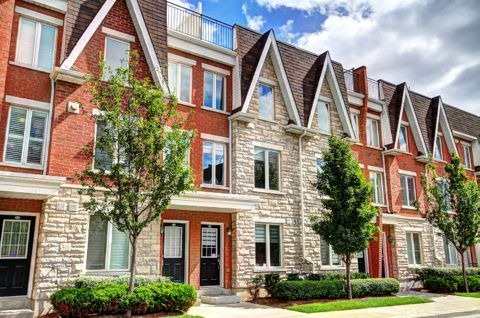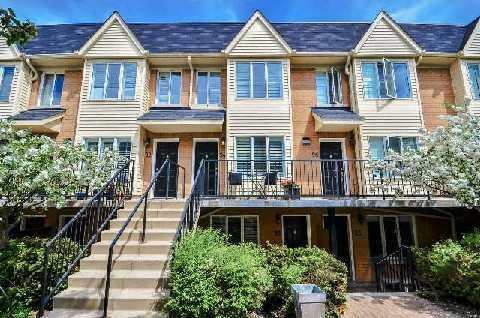Thinking of buying a townhouse in the Greater Toronto/Hamilton area? We’ve put together this guide with everything you need to know!
Townhouse Basics
Definition: In Canada, the words townhouse and townhome are used interchangeably and refer to a single-family home that shares walls with other independently-owned homes in a purpose-built complex. Townhouses are different from semi-detached homes, attached houses and rowhouses; though they all share walls with their neighbours, semi-detached, attached and rowhouses have no legal or financial relationship with their neighbours and have no physical features in common.

Types: There are two types of townhomes in the GTA: freeholds and condominium townhouses (which are more common in Toronto)
Freehold townhouse – legally and financially, a freehold townhouse is the same as a regular single family house – the homeowner owns both the house and the land it is built on and is responsible for all the maintenance, including roof, windows, electrical, plumbing, etc.
Condominium townhouse – a type of condominium where owners own a percentage of the condo corporation vs any actual land. Owners of condo townhouses pay monthly maintenance fees that cover water/garbage/sewage and shared amenity costs. Part of those fees go towards building a reserve fund,which is used for bigger maintenance/renovations of the complex. Condo townhouse owners are only responsible for maintaining the inside of the home.
Stacked townhouse is two or more individual townhouses that are stacked on top of each other and are owned individually. In Toronto, we often see the first townhouse in the stack comprising the basement and main level, while the second and third floor form another unit. Each is owned individually and has private and secure access directly into the home.
How Much is a Townhouse?
Townhouses in the GTA are usually cheaper than single family homes and more expensive than condominium apartments.
Townhouse Prices in the Greater Toronto Area
Townhouses are more affordable than detached or semi-detached houses. In fact, in July 2020, the average condo townhome sold in Toronto was:
- 53% cheaper than a detached house (over $816,000 less expensive)
- 39% cheaper than a semi-detached home ($456,000 cheaper)
Average Condominium Townhouse Prices (July 2020)

| COMMUNITY | AVERAGE PRICE |
|---|---|
| Toronto | $724,655 |
| Mississauga | $647,618 |
| Oakville | $655,453 |
| York Region | $702,729 |
| Durham Region | $494,669 |
| Burlington | $651,282 |
Average Freehold Townhome* Prices (July 2020)
| COMMUNITY | AVERAGE PRICE |
|---|---|
| Toronto | $1,080,388 |
| Mississauga | $796,926 |
| Oakville | $725,636 |
| York Region | $858,267 |
| Durham Region | $627,122 |
| Burlington | $751,830 |
* Note: the Toronto Regional Real Estate Board combines the statistics for freehold towns, attached houses and rowhouses
Closing Costs
If you’re buying a townhouse, you’ll need to budget for closing costs. This will include:
- Ontario Land Transfer Tax
- Toronto Land Transfer Tax (if you’re buying in the 416)
- Legal Fees
Read more about closing costs here.
Ongoing Costs
Be prepared to pay:
- Home insurance
- Property taxes
- Maintenance fees (for condo towns)
- Utilities
- Water/garbage/sewage (for freeholds)
- Repairs/renovations (as required)
Pros & Cons of Living in a Condominium Townhouse
Advantages:
- Affordability – Townhouses are usually more affordable than traditional houses
- Lower maintenance fees than condos – Townhouse condo maintenance fees are usually lower than condo apartment fees because townhouses tend to have fewer amenities, services and full-time staff like a concierge. It’s not uncommon to see townhouse maintenance fees that are half as expensive as condo apartment fees.
- Location – Townhomes in Toronto tend to be located in prime residential neighbourhoods, near schools and amenities – and because they’re cheaper than regular houses, you can probably afford to live in a better neighbourhood than you otherwise could afford.
- Size and space – Townhouses in the GTA tend to be bigger than their condominium apartment counterparts.
- Less Maintenance – The condo corp will often take care of ongoing maintenance that benefits all owners, for example, snow removal, annual furnace maintenance, window cleaning, gardening in shared areas.
- Outdoor Space – Toronto towns often have private ground floor or rooftop terraces (or both). Unlike most condo apartment buildings, barbecues are usually permitted (propane tanks can’t be transported in elevators).
- Security – Many townhouse complexes in the GTA have security guards at night,
- Lower Heating Bills – You can thank your neighbours for helping to insulate your home and preventing heat loss!
- Amenities – Many townhouses in Toronto are part of a larger condominium apartment complex and may have access to shared gyms, party rooms or pools. While this adds to the monthly maintenance fees, it can add to your lifestyle too.
- Parking – Most condo townhouses in the GTA have private parking spots, either in a shared parking garage or via a garage attached to the home.
Disadvantages:
- Neighbours! In a middle unit of a stacked townhouse, you may have someone above and below you, and someone to the left and the right. Before buying a townhouse, pay close attention to noise transfer and sound-proofing.
- Rules and Pet Restrictions– condo townhouses have rules and bylaws that must be followed – those rules might dictate the colour of your window coverings, what you can store on your balcony or terrace and how many pets you can have. You can’t just decide to install solar panels or a metal roof – the cohesive look of the complex is important for maintaining property values.
- Maintenance Fees – While townhouse maintenance fees tend to be lower than condominium apartment fees, it’s still a monthly cost you need to pay.
- So Many Stairs – Because townhouses tend to be more vertical than horizontal, there can be a lot of stairs! There are plenty of 3 and 4-storey townhouses in Toronto
Top Tips for Buying a Townhouse
Keep the following in mind:
- The location of the townhouse within the complex impacts price and may impact your enjoyment of the property. Pay close attention to what’s nearby.
- While househunting, listen for noises coming from the other units and watch for how busy the common shared spaces are.
- Make sure to view the parking space (especially if it’s in a shared parking garage).
- You’ll want to seriously consider getting a home inspection, especially if you’re buying a freehold or an older condo townhouse (where you often own the furnace, air conditioning and other systems).
- If you’re buying a condo-townhouse, you’ll need to have your lawyer review the status certificate (it contains the financial and legal health of the corporation). The status certificate will also help you understand how maintenance fees have changed over time (and whether any increases are planned).
- Read the rules and by-laws so you have a full understanding of the restrictions and expectations.
- If it was built between 1995 and 2007, ask about Kitec plumbing. If Kitec is in the unit, it will likely need to be replaced.
- The value of a townhouse is determined by looking at nearby, recently sold comparable units. Your REALTOR will adjust the per square foot cost of those units, taking into how the units differ. For example, an end-unit is more valuable because there’s only one attached neighbour; prime locations in the complex are worth more than units that are next to the rail tracks or on a busy street.
- Not all townhouses are created equal – quality and workmanship vary a lot. Do your due diligence and make sure you’re working with a REALTOR who’s familiar with the complexes you’re looking at.

thushara Lokuge says:
If I buy a townhouse, am I allowed to run Abnb ?
Brendan Powell says:
That will depend on whether it’s a condo townhouse or freehold, and where it’s located.
If it’s a condo, then you will need to make sure you follow any condo rules around short term rentals, although a townhouse complex is less likely to have restrictions than an apartment building.
In addition, you may have regulations from the municipality you need to comply with – for example, in Toronto short term rentals need to be registered and are limited to people’s principal residence: https://www.toronto.ca/community-people/housing-shelter/short-term-rentals/
Rocky says:
I live in a freehold townhouse in Mississauga that has a maintenance fee for the private road, snow clearing which is managed by a property company ect… do I still have the right to my entire property like any other freehold?
Brendan Powell says:
As there are many different versions of common area ownership, I can’t give you a definitive answer without knowing more – the best place to go for a full answer would be your real estate lawyer (ask the one you used for the purchase!)
Generally speaking though, if you own a freehold townhouse, your ownership should be the same as a semitdetached house. The part that can change is how common areas are handled – e.g. sometimes there are private areas like a private roadway, park area, landscaping etc that do not belong to individual owners–this can for example be handled by having a “common element condominium” – essentially a condo” consisting of only that park/road – that is “tied” to each townhouse’s freehold ownership. OR sometimes there are no commonly owned parts, and the complex simply has a maintenance contract for things like snow removal.
There are many different possibilities! Speak to your lawyer and they should be able to give you a clear answer for your situation.
Sayvari says:
Hi, I am curious in a townhome can I make additions like an extra washroom from an exisitng washroom space or create one in the laundry space.
Brendan Powell says:
It would depend on the townhouse – but typically, in a condo townhouse, any significant renovations would need to be approved by the board, although that typically involves making sure all work is done safely by professionals. If you are in a freehold townhouse where you own the whole thing (including things like electrical and plumbing behind the walls), then it would obviously be easier. Unfortunately there is no one generalized answer for every situation–best would be to inquire with the property management of any specific place you are thinking of renovating.